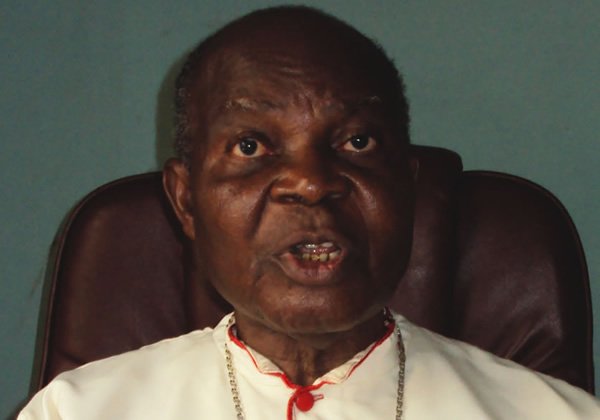The workability of the Federal Character principle has come under scrutiny lately during the screening and confirmation hearing of the 38 members of the FederalCharacter Commission. This is a modest attempt to elucidate and provide more explanation on a topical national issue often misconstrued by many.
On Tuesday, June 2, on the floor of the Senate, members made a feeble effort to rationalize the perceived sectional appointment of administrative and political heads of the Commission. The bone of contention is the ‘un-federal’ decision of President Muhammadu Buhari to appoint two ‘northerners’ as chairman and secretary of the FCC. The chairman, Hajia Fareedah Dankaka hails from Kwara State while the incumbent secretary is from Taraba State.
At the senate session, the Senate Minority Leader, Senator Enyinnaya Abaribe made an observation on what was generally, albeit erroneously, perceived as lop-sidedness in re-constituting membership of the commission. For the sake of proper analysis, we quote relevant portions of a story published by Thisday newspaper:
Abaribe had kicked against the emerging situation of Nigerians from the same part of the country occupying the Chairmanship and Secretary-ship positions of the commission.
The Minority Leader, who made the observation before the confirmation of appointments of the nominees, said the two principal positions in the commission have always been occupied on the basis of north and south.
According to him, over the years, while competent Nigerians from the north have been appointed as Chairman of the Commission, the Secretary to the Commission has always been from the south in line with Section 14(3) of the 1999 Constitution as amended.
Appointment of Mohammed Bello Tukur from Taraba State in 2017 as Secretary of the Commission by President Muhammadu Buhari gave the impression that a new Chairman would be from the South but nomination of Dr Muheeba Dankaka from Kwara State as the new chairman, violated the age long principle. The Senate needs to look into this in the spirit of the principles of federal character itself.
Contributing, the Deputy President of the Senate, Senator Ovie Omo-Agege said the submission of Abaribe is targeted at the powers of President Buhari on nomination and appointment of competent Nigerians into public office.
According to him, though the issue of balancing raised by Abaribe as regards the two principal positions of the commission is germane but perceived anomalies would be corrected in months to come. President Buhari is aware of the need to balance the positions and will do that when the tenure of the incumbent secretary expires in February next year.
‘Mr President, this issue has been in the public domain since the nominees were sent here for confirmation and since there is window of redressing perceived anomaly in a few months time, I will urge us to please forge ahead with the confirmation,’ he said.
Flowing from the above, we can isolate two germane issues. First, Senators misconstrued the application of the principle of federal character as it relates to the appointment of 38 members of the Commission as prescribed under Section 153 of the 1999 Constitution of the Federal Republic of Nigeria. Specifically, the Third Schedule, Part 1C of the Constitution says the Commission shall comprise of a chairman and representatives of each state of the federation and the FCT. The FCC has, speaking to the Constitution, 38 members!
Besides the constitutional provision quoted above, the FCC was also midwifed by a separate law. The FederalCharacter Commission Establishment Act of 1995 provides in Section 9 for the office of the Secretary to the Commission. Under this Act, the secretary is not a member of the commission; he is in fact, a staff of the commission; he functions as the head of the commission’s secretariat; and he is appointed by the President.
The above explanations are clear, unambiguous and ought to be properly interpreted. But politicians, including lawyers, may choose to be guided by politics mixed with emotion.
Going forward, the FCC, over the years, has evolved guidelines and measures to shape its operations. We shall come back to these soon.
The kernel of this discourse is the misinformation by politicians and journalists. My brother, Olusegun Adeniyi, in his column, The Verdict, also joined the fray when he wrote, inter alia:
“…despite the absurdity of an agency established to enthrone fair play in a federal system subverting its own ideal, President Buhari has nominated Fareedah Dankaka (from Kwara State) to chair the Federal CharacterCommission.
This is against the background that in March 2017, the president had appointed Mr. Muhammad Bello Tukur (from Taraba) as the Commission’s Secretary and Chief Executive Officer. So, the FCC that is established to “promote, monitor and enforce compliance with the principles of proportional sharing of all bureaucratic, economic, media and political posts at all levels of government” already has a leadership that is sectional.”
Has the President violated any legal or moral code in appointing the chairman from Kwara when the seating secretary hails from Taraba? The answer is NO. The two offices are not on the same platform so there is no juxtaposition. The office of chairman is a creation of the Constitution whereas that of the secretary was created by the FCC Act. That is why one state can produce the chairman and still produce a member of the Commission. It is therefore awkward to argue that the two must be viewed from the prism of the federal character principle. That amounts to subtly questioning the judgement and authority of the President.
The Commission was established by Act No 34 of 1996, now cited as FCC Act. Cap F7 Laws of the Federation of Nigeria 2004, which mandates it to implement and enforce the federal character principle and formulae for equitable distribution of public posts, socio-economic amenities and infrastructural facilities across the country.
When the federal character principle appears in national discourse, many are wont to limit this mandate to mere distribution of positions and offices. To be sure, the principle mandates FCC to ensure that each state of the federation and the Federal Capital Territory are equitably represented in all national institutions and in public enterprises and organizations.
The guiding principles of federal character remain equity and fairness. It cannot be parity as some are wont to argue. Specifically, the FCC Act, under guiding principles and formulae for the distribution of posts says: i, Each State of the Federation and the Federal Capital Territory shall be equitably represented in all national institutions and in public enterprises and organisations.
ii, The best and most competent persons shall be recruited from each State of the Federation to fill positions reserved for the indigenes of the State or the Federal Capital Territory.
iii, Once a candidate has attained the necessary minimum requirement for appointment to a position, he shall qualify to fill a relevant vacancy reserved for indigenes of his State or the Federal Capital Territory.
iv, Where the number of positions available cannot go round the States of the Federation or the Federal Capital Territory, the distribution shall be on zonal basis but in the case where two positions are available, the positions shall be shared between the northern and the southern zones.
Item number iv above is particularly relevant to the present discourse. The number of positions available at FCC as discussed at the Senate did go round all the States and the FCT. Every State as well as the FCT has a commissioner as a statutory member of the Commission. In this instance also, there is only one opening for the position of Chairman. The position of Secretary is not vacant presently. The argument on north-south distribution is therefore inappropriate and disingenuous.
For those who may not be aware, the principle of equity and fairness, in the Nigerian context, also applies to provision of physical facilities such as roads, bridges, hospitals and even provision of potable water. Campaigners for good governance may look in his direction in tasking the President as well as State Governors!









